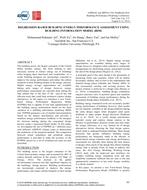With the rapidly rising energy costs and a growing need to conserve energy, more and morebuildings are being analyzed for energy effectiveness using sophisticated computer programs.One problem inherent in these programs is the lack of an accurate but simple method forestimating air infiltration rate, which is known to be a significant component of the energyconsumption. To develop such a method, a computer study of air leakage characteristics was madefor tall buildings using surface wind pressure data obtained in a boundary layer wind tunnel.The results for a fully exposed tall building in a suburban area were reported by Shaw andTamura (1). This paper presents new data on pressure distributions over the faces of a tallbuilding surrounded by lower structures of uniform height. The building and the surroundingstructures are separated from each other by a distance equivalent to that of a street andsidewalks.
Equations for predicting air infiltration rate have been derived using basically the samemethod as in the paper for fully exposed tall buildings (1). These equations are strictly validonly for a tall building surrounded by lower structures of approximately equal height. They maynot be generalized for a tall building partially protected by another tall building unless thebuildings are sufficiently far apart.
Citation: ASHRAE Transactions, Volume 85, Part 1, Philadelphia, PA
Product Details
- Published:
- 1979
- Number of Pages:
- 13
- File Size:
- 1 file , 520 KB
- Product Code(s):
- D-PH-2514


